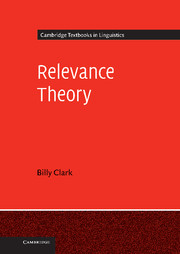Book contents
- Frontmatter
- Contents
- List of Figures and tables
- Preface
- Acknowledgements
- Typographical conventions
- Part I Overview
- Part II Details and developments
- 5 Explicature and implicature
- 6 Types of explicature
- 7 Types of implicature
- 8 Lexical pragmatics
- 9 Figurative language: metaphor
- 10 Figurative language: irony
- 11 Linguistic semantics
- 12 Conclusion: applications and recent developments
- Appendix Key notions of relevance theory
- Notes to chapters
- Bibliography and other resources
- Index
11 - Linguistic semantics
from Part II - Details and developments
Published online by Cambridge University Press: 05 June 2013
- Frontmatter
- Contents
- List of Figures and tables
- Preface
- Acknowledgements
- Typographical conventions
- Part I Overview
- Part II Details and developments
- 5 Explicature and implicature
- 6 Types of explicature
- 7 Types of implicature
- 8 Lexical pragmatics
- 9 Figurative language: metaphor
- 10 Figurative language: irony
- 11 Linguistic semantics
- 12 Conclusion: applications and recent developments
- Appendix Key notions of relevance theory
- Notes to chapters
- Bibliography and other resources
- Index
Summary
Topics: semantics and pragmatics; representation, translation and interpretation; from words to the world: two kinds of semantics; concepts and procedures: two kinds of meaning
Overview
While relevance theory is often thought of as a theory of pragmatics, many of its most important applications have been within the domain of linguistic semantics. This chapter begins by considering the relationship between semantics and pragmatics. One thing that this book assumes is that there is a significant two-way relationship between work in semantics and work in pragmatics. On the one hand, it is not possible to make significant progress in semantics without having at least some idea of the kind of pragmatic theory which the semantic analyses will interact with to determine interpretations in context. At the same time, it is not possible to explain how interpreters move from linguistically encoded meanings to contextually inferred meanings without having some idea of what kinds of meanings are linguistically encoded. Progress in semantics depends on assumptions about pragmatics and progress in pragmatics depends on assumptions about semantics. The powerful pragmatic theory provided by relevance theory makes it possible to see how very general semantic analyses can form the basis for a wide range of interpretations in specific contexts, This chapter looks at the general picture of the semantics–pragmatics distinction assumed by relevance theory and at some of the kinds of linguistically encoded meanings which have been proposed within this approach. Section 11.2 explores general assumptions about the relationship between semantics and pragmatics. Section 11.3 considers three important notions in the consideration of linguistic meaning: representation, translation and interpretation. Section 11.4 considers how relevance theory makes connections between linguistic expressions and entities in the world.
- Type
- Chapter
- Information
- Relevance Theory , pp. 295 - 327Publisher: Cambridge University PressPrint publication year: 2013



